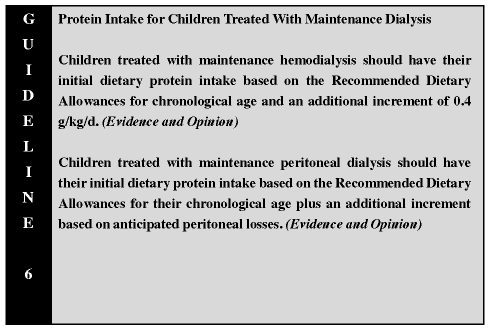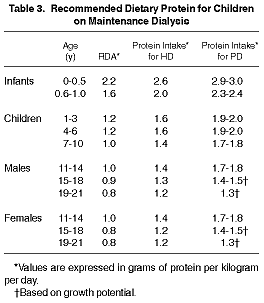

Limited data are available to demonstrate the optimal amount of protein for dialysis-dependent children. Patients undergoing chronic HD should be prescribed the RDA for age plus an increment of 0.4 g/kg/d to consistently achieve a positive nitrogen balance (Table 3).40 This recommendation is based on studies performed in adult patients on MHD who demonstrated the presence of malnutrition when they received 0.75 g/kg/d and in whom the ingestion of 1.1 g/kg/d of protein of high biological value was not adequate to maintain nitrogen balance.41 Moreover, the use of dietary protein restriction has lead to poor growth in children undergoing HD.37 There are no data, however, that demonstrate any advantage of protein supplemented at a rate above the combination of the RDA and the assumed dialysate losses with regard to growth rate or other measures of nutritional status.

The DPI is higher for patients treated with peritoneal dialysis than for those on HD because there is constant loss of protein and amino acids through the peritoneal membrane (Table 3).35,36,42,43 The recommendations for daily protein intake in children undergoing chronic maintenance peritoneal dialysis are based on expert opinion. These recommendations were derived somewhat empirically in 198244 based on older RDA recommendations,33 dialysate protein losses,35,36,42 and nitrogen balance studies performed in adult patients treated with CAPD.45 The Work Group could find no studies to suggest any basis other than the RDA. The supplemental factor for replacement of transperitoneal loss is based on clinical data.35,36,42 These data suggest that protein loss is inversely related to age and size, so that smaller and, therefore, younger children have proportionately higher losses. An initial diet prescription at the higher end of the recommendation for infants and toddlers and the lower end for older children and adolescents would be appropriate. Given the wide variability in transperitoneal protein losses in children, careful monitoring and appropriate adjustments in diet prescription are mandatory.
It should be noted that the recommended ranges are for children at the initiation of dialysis. Follow-up evaluations and routine measures of protein and calorie nutritional status as recommended in other guidelines within this document may necessitate adjustments.